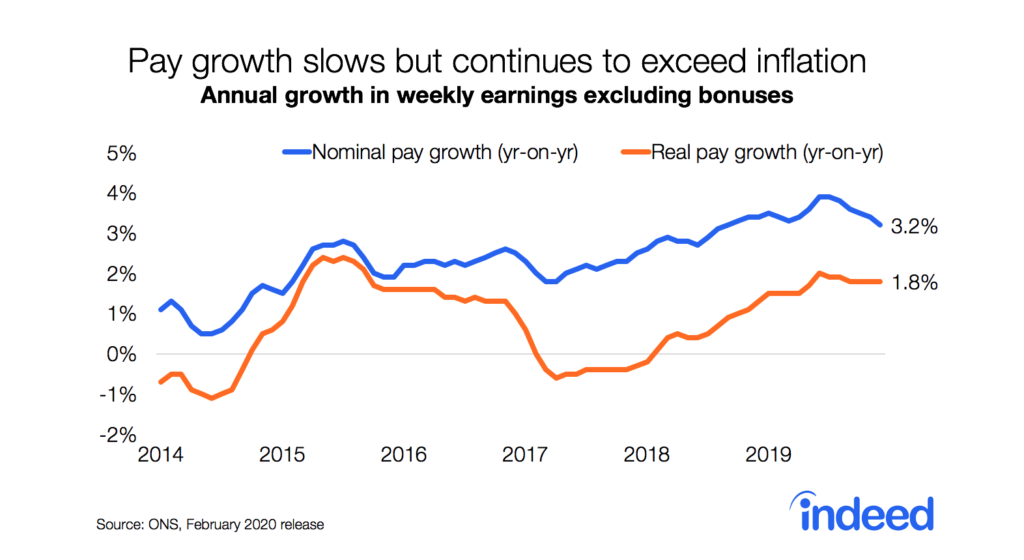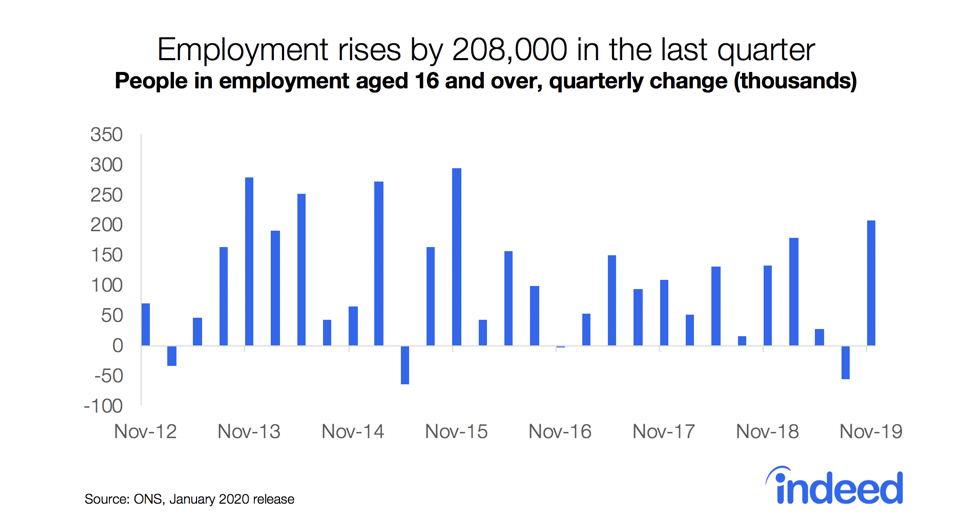Last week’s vote by the United Kingdom to leave the European Union has plunged the continent into a state of crisis. No country has left the bloc since Greenland quit the EU’s predecessor, the European Economic Community, in 1985—and while negotiations over the UK’s departure are supposed to take two years under Article 50 of the Lisbon Treaty, nobody knows when this process will start.
Freedom of movement, long-enshrined as a key pillar of the EU, will soon be a thing of the past for UK citizens. But what, if anything, will replace it? And how will the referendum result affect the three million EU citizens who currently live and work in the UK?
Businesses and banks dislike uncertainty, of course—and so do job seekers. After the results were announced last Friday morning, Indeed saw a huge spike in job search leaving the UK, and surges of interest towards EU-member Ireland but also other English-speaking job markets, located far from Europe. This data can provide us with a snapshot of how labor markets are responding to Brexit, so let’s take a closer look.
The impact of Brexit on UK to EU job search
When the Greek government held a referendum on the terms of its bailout agreement in 2015, Indeed saw a spike in Greek job seekers searching for work elsewhere in the EU. In the aftermath of the Brexit vote, we saw a similar pattern.
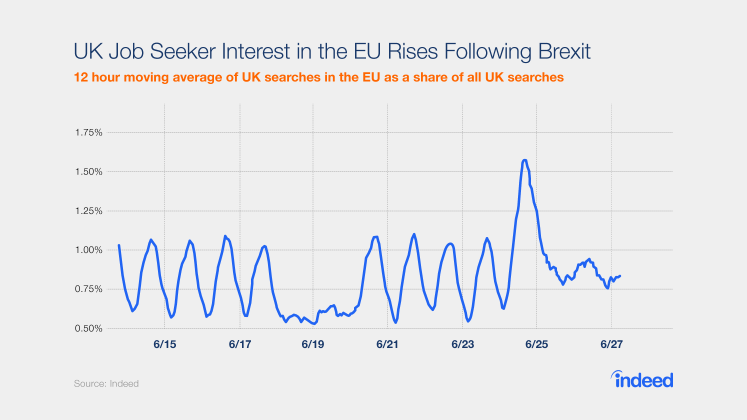
In fact, Indeed data shows that in the 48 hours following the announcement of the results, the share of UK job seekers looking for opportunities in European countries was double the average in the days prior to the vote. As for what they were looking for, top searches included roles in marketing, human resources, hospitality and the finance sectors.
With millions of citizens of other EU countries currently based in the UK—many of whom had expressed concern about their future in the run-up to the referendum—this surge in EU-oriented job search could be a reflection of that anxiety. Facing an uncertain future in the UK, it is likely that many EU citizens might be inclined to look at opportunities elsewhere in the EU, even if they are not ready to make such a move yet.
Ireland a major beneficiary of job search from the UK following Brexit
When we study the UK to EU job search a little more closely, we find that Ireland was a major beneficiary of the post-Brexit surge.
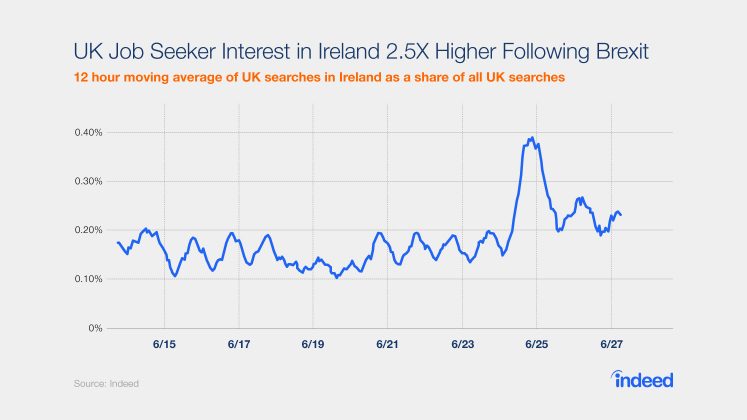
At their peak, job searches from the UK to Ireland on June 24th (the day the result of the referendum was announced) were 2.5 times higher than the average in the days before the vote. Job seekers were looking for work in fields including marketing, human resources, engineering, transportation and retail.
In fact, UK interest in Ireland was strong even before the referendum, as the Irish government reported a surge in applications for Irish passports from UK citizens with Irish ancestry. In the immediate aftermath of the referendum, Ireland’s minister for foreign affairs asked UK citizens seeking passports to slow down as they were in danger of overwhelming the system.
EU job seekers also have growing interest in Ireland
Ireland did not only benefit in a surge from job search from the UK. Traffic from the rest of the EU also increased.
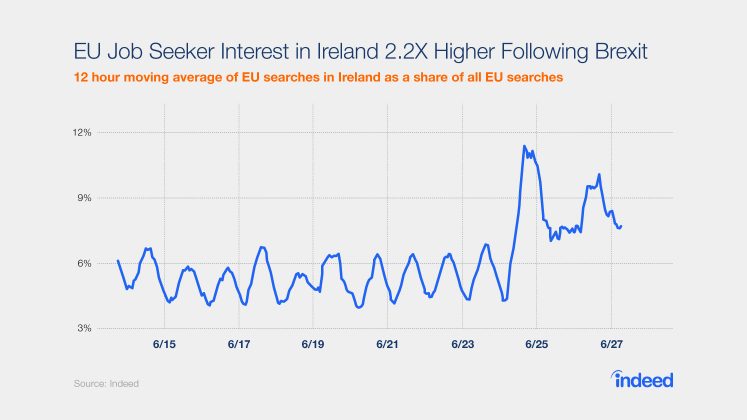
Here the spike was not quite as large as search from the UK, but it was still substantial—2.2 times higher than the average in the days before the results of the referendum were announced.
With the UK out of the EU, Ireland becomes the only country with access to the common market where English is spoken as a first language by the majority of its citizens. Perhaps in the future we will see international banks and businesses moving from London to Dublin.
Last Friday, however, job seekers in Europe were already relocating their interest, searching for work as drivers, electricians, marketers and also in retail. And in fact, Ireland currently has the fastest growing economy in the EU, although since the UK economy is much larger there are still more opportunities for EU job seekers in the UK—for now, at least.
Brexit resulted in job search jump between the UK and the rest of the world
Intriguingly, the vote for Brexit also led many UK-based job seekers to search for work abroad, but beyond the borders of the EU.
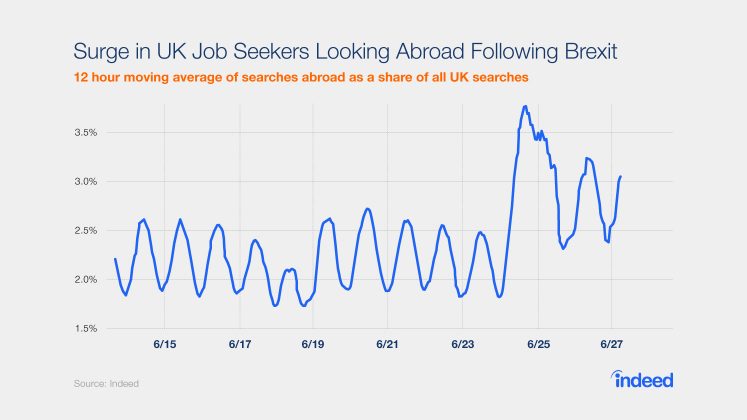
In fact, searches from the UK to the rest of the world were 73% higher at their peak on June 24th than the average in the days before the results of the referendum were announced
It is important to note, however, that even before the referendum UK job seekers looking for work abroad were least likely of all EU citizens to search inside the EU itself. In fact, more UK job search was targeted at the US than at the rest of the EU put together.
Even so, it is striking that after the vote to leave the EU, there was a mini-Brexit on Indeed, as significant numbers of people started searching for work outside the bloc altogether.
Post-Brexit, the biggest spike in UK foreign job search was outside the EU
In fact, many UK job seekers started looking for work in English-speaking countries besides Ireland, located outside the EU. In Canada, job search from the UK was 4.2 times higher than the average in the days before the results of the referendum were announced—a much bigger spike than observed in Ireland and the EU.
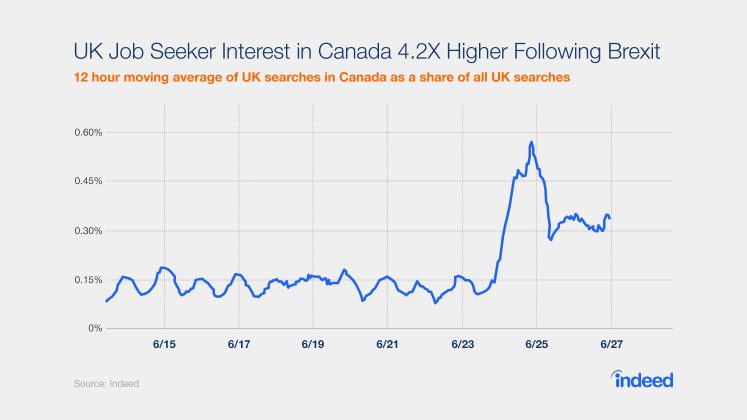
In other English-speaking job markets there was also a jump: In the US, job search for the UK increased by 1.7 and by 1.9 in Australia.
Thus while post-Brexit job search patterns show that many job seekers in the UK are still oriented towards the EU, many others feel strong ties to the “anglosphere” of UK’s former colonial territories. The Brexit vote served to intensify this interest.
Where now for the UK?
UK employers have historically benefitted from the ability to recruit talent from overseas, and many Britons have seized the opportunity to live and work in other EU countries.
While it’s unlikely that the shutters will suddenly be brought down on the English Channel, the free movement of workers has clear economic benefits—and it’s essential that British businesses can continue to find and hire the people they need to fill their job vacancies.
If Brexit is allowed to interrupt the flow of talent to the UK, the data makes clear that Ireland will benefit. Skilled workers are lured to its dynamic and English-speaking labor market. But as the Canadian search traffic reveals, the repercussions for UK talent could be much wider, and may even benefit employers on the other side of the Atlantic.
Want to know more about how the Brexit vote is affecting jobs and hiring?
On Thursday, June 30 at 10am EST, Indeed economists Tara Sinclair and Mariano Mamertino will take your questions live on Facebook. Visit our Facebook page at 10am on Thursday to join.




